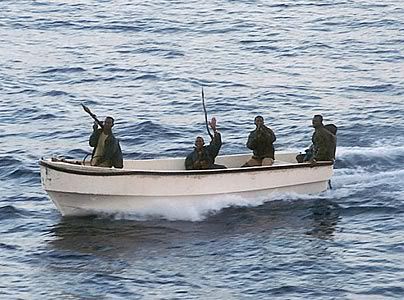 These are Somali pirates on the high seas. At some point the US Navy will probably deal harshly on them and their fellow pirates. Who are they and why are they pirates?
These are Somali pirates on the high seas. At some point the US Navy will probably deal harshly on them and their fellow pirates. Who are they and why are they pirates?
They're mainly fishermen, and they're pirates now because they have no real choice. This boat you see? It used to be a typical Somali fishing boat...
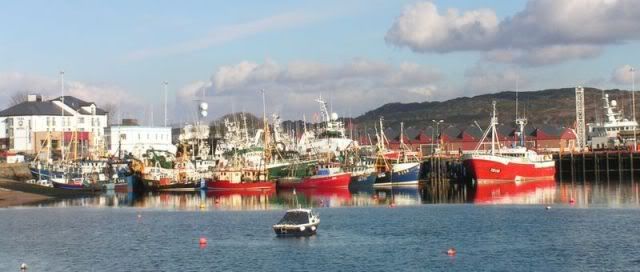
This is what most Americans visualize when they think of fishing boats.
Beijing - Pirates off the coast of Somalia have seized a Chinese fishing boat and 24 crew including Vietnamese, Philippine and Japanese citizens, Chinese state media reported on Friday.
Pirates, who claim that they are protecting Somali national resources from illegal fishing and waste dumping, often contact local media to say "that they have captured" ships fishing off the coast of Somalia and to state their demands for ransom.
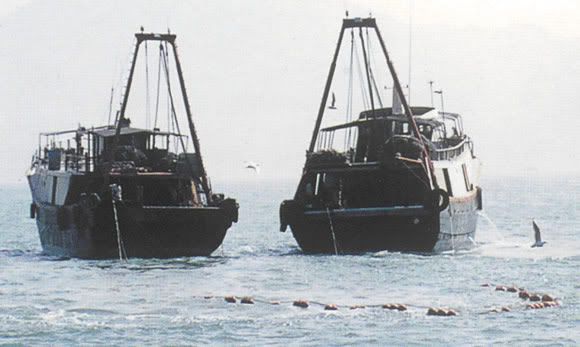 These are two Chinese fishing trawlers. They are playing out a net in excess of a hundred meters wide and are preparing to take everything in the water too slow to get out of the way. This is how the Chinese and many other nations fish. Off the coast of Somalia.
These are two Chinese fishing trawlers. They are playing out a net in excess of a hundred meters wide and are preparing to take everything in the water too slow to get out of the way. This is how the Chinese and many other nations fish. Off the coast of Somalia.
The five ships seized, according to Kenyan maritime groups, include a German freighter, a Taiwanese fishing trawler, a Yemeni tugboat, a French yacht, and a British cargo ship.
You see, Somalia has no government, and as a direct result cannot control it's own coast line; cannot enforce it's own sovereignty over the waters that used to feed the country with it's bounty. Now it feeds China and most of Asia instead.
A Thai fishing boat has been hijacked off the Somali coast with 16 crew members onboard, a regional maritime official said on Wednesday. Ten Chinese sailors were among those captured by suspected pirates when they seized two South Korean-owned fishing ships off Somalia, Xinhua News Agency reported Thursday.
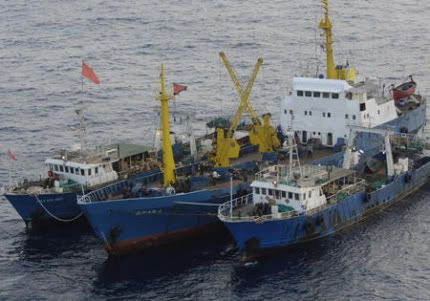 This picture shows two trawlers next to their mother ship, their factory ship. This ship takes on the trawlers haul, and processes and the catch on the spot, tossing overboard any unneeded guts or blood, chumming the waters for the sharks.
This picture shows two trawlers next to their mother ship, their factory ship. This ship takes on the trawlers haul, and processes and the catch on the spot, tossing overboard any unneeded guts or blood, chumming the waters for the sharks.
The Chinese Embassy in Kenya was urgently trying to learn the condition of the sailors and secure their release, according to the report. The Yemeni Embassy in Washington said its coast guard exchanged gunfire Monday with 14 Somali pirates who had hijacked a 23-foot Yemeni fishing vessel. Its forces freed 13 Yemeni hostages and detained two pirates, while the rest fled on a boat, the embassy said.
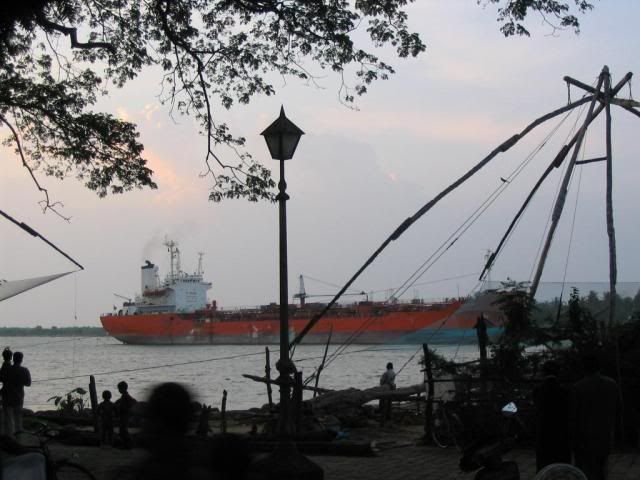 This is a picture of a typical Chinese factory ship. It looks large enough to be a supertanker, but it is a fish food factory. Somali fishermen used to earn about $300 million a year off of fishing and gathering in the bounty in their territorial waters. It provided them a living, food for fellow Somalians, and a cash export product to the rest of the world. The UN estimates Somali pirates made about $140 million in ransoms and bribes last year.
This is a picture of a typical Chinese factory ship. It looks large enough to be a supertanker, but it is a fish food factory. Somali fishermen used to earn about $300 million a year off of fishing and gathering in the bounty in their territorial waters. It provided them a living, food for fellow Somalians, and a cash export product to the rest of the world. The UN estimates Somali pirates made about $140 million in ransoms and bribes last year.
The Egyptian boats were taken in the gulf off Somalia's northern coast. Said Mursi, Egypt's ambassador to Somalia who is based in Kenya, said the trawlers probably did not have licenses to fish Somali waters. "From my experience, I think that they were illegally fishing," he told The Associated Press.
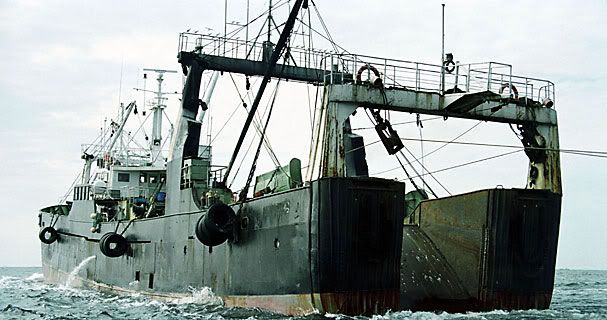 Some countries, like Taiwan and Japan, have highly efficient fishing boats that combine the functions of trawler and factory ship. All of these super fish boats not only empty the waters, they strip the sea floor, destroying the ecosystem that attracted the fish.
Some countries, like Taiwan and Japan, have highly efficient fishing boats that combine the functions of trawler and factory ship. All of these super fish boats not only empty the waters, they strip the sea floor, destroying the ecosystem that attracted the fish.
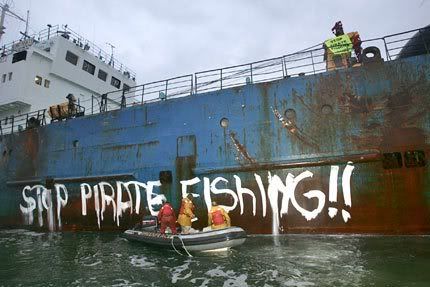 None of the countries pay license to fish in Somali waters. It's free because Somalia is without the means to protect it's own territorial waters. These countries could pay, say, the UN to fish here, who would administer the money to buy food and to help Somalia, but they never have had to. Ever since Somalia collapsed many years ago, it's been free for the taking, and they have taken it all, and driven the Somali fishing industry into oblivion.
None of the countries pay license to fish in Somali waters. It's free because Somalia is without the means to protect it's own territorial waters. These countries could pay, say, the UN to fish here, who would administer the money to buy food and to help Somalia, but they never have had to. Ever since Somalia collapsed many years ago, it's been free for the taking, and they have taken it all, and driven the Somali fishing industry into oblivion.
Or, I should say, into piracy.
 These are Somali pirates on the high seas. At some point the US Navy will probably deal harshly on them and their fellow pirates. Who are they and why are they pirates?
These are Somali pirates on the high seas. At some point the US Navy will probably deal harshly on them and their fellow pirates. Who are they and why are they pirates?
 These are two Chinese fishing trawlers. They are playing out a net in excess of a hundred meters wide and are preparing to take everything in the water too slow to get out of the way. This is how the Chinese and many other nations fish. Off the coast of Somalia.
These are two Chinese fishing trawlers. They are playing out a net in excess of a hundred meters wide and are preparing to take everything in the water too slow to get out of the way. This is how the Chinese and many other nations fish. Off the coast of Somalia. This picture shows two trawlers next to their mother ship, their factory ship. This ship takes on the trawlers haul, and processes and the catch on the spot, tossing overboard any unneeded guts or blood, chumming the waters for the sharks.
This picture shows two trawlers next to their mother ship, their factory ship. This ship takes on the trawlers haul, and processes and the catch on the spot, tossing overboard any unneeded guts or blood, chumming the waters for the sharks. This is a picture of a typical Chinese factory ship. It looks large enough to be a supertanker, but it is a fish food factory. Somali fishermen used to earn about $300 million a year off of fishing and gathering in the bounty in their territorial waters. It provided them a living, food for fellow Somalians, and a cash export product to the rest of the world. The UN estimates Somali pirates made about $140 million in ransoms and bribes last year.
This is a picture of a typical Chinese factory ship. It looks large enough to be a supertanker, but it is a fish food factory. Somali fishermen used to earn about $300 million a year off of fishing and gathering in the bounty in their territorial waters. It provided them a living, food for fellow Somalians, and a cash export product to the rest of the world. The UN estimates Somali pirates made about $140 million in ransoms and bribes last year. Some countries, like Taiwan and Japan, have highly efficient fishing boats that combine the functions of trawler and factory ship. All of these super fish boats not only empty the waters, they strip the sea floor, destroying the ecosystem that attracted the fish.
Some countries, like Taiwan and Japan, have highly efficient fishing boats that combine the functions of trawler and factory ship. All of these super fish boats not only empty the waters, they strip the sea floor, destroying the ecosystem that attracted the fish. None of the countries pay license to fish in Somali waters. It's free because Somalia is without the means to protect it's own territorial waters. These countries could pay, say, the UN to fish here, who would administer the money to buy food and to help Somalia, but they never have had to. Ever since Somalia collapsed many years ago, it's been free for the taking, and they have taken it all, and driven the Somali fishing industry into oblivion.
None of the countries pay license to fish in Somali waters. It's free because Somalia is without the means to protect it's own territorial waters. These countries could pay, say, the UN to fish here, who would administer the money to buy food and to help Somalia, but they never have had to. Ever since Somalia collapsed many years ago, it's been free for the taking, and they have taken it all, and driven the Somali fishing industry into oblivion.